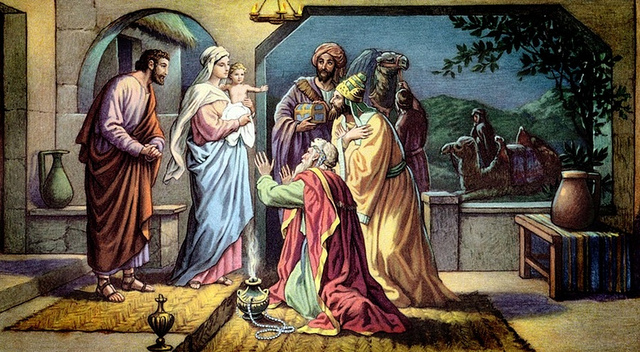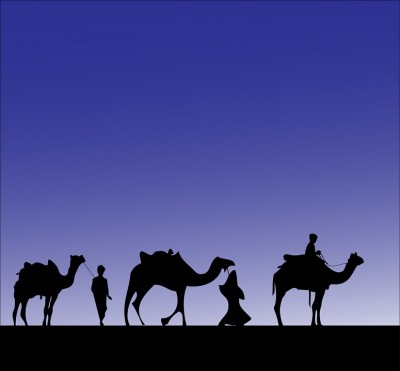And lo, to their great surprise, the star which they saw in the east then appeared . . ..
—John Gill, Exposition of the New Testament (1746-8)
Nothing will awaken those that are resolved to be regardless.
—Matthew Henry, Commentary on the Whole Bible (1712)
Where Is He . . .?
When Jesus was born in Bethlehem of Judea in the days of Herod the king, there came Magi, stargazers, from the East to Jerusalem. These wise men weren’t from the Orient. They most likely came from Persia. They weren’t kings, and Scripture doesn’t say how many of them there actually were. But certainly, their arrival was enough to get Jerusalem all wound up and draw the attention of the whole city to their one question: “Where is He that is born King of the Jews?”
There was no ambiguity in the question. The wise men weren’t asking after recently born “princelings” in general. They weren’t asking about a child who would one day become a king. They were looking for the One whose very birth made Him the King of Israel by divine right. They were looking for the Messiah.
Everyone who heard their question understood its significance. These wise men claimed that the Messiah had already been born. They further claimed to have astral evidence: “We have seen His star in the East and are come to worship Him.” We don’t know exactly what they saw, but the few details given in Scripture are only beginning to match up with the conjunctions, comets, and super novae that we’re familiar with. Whatever the nature of the star, these wise men were sure that it was a sign from the God of heaven.
The Magi came to the court of Herod the Great. It was the obvious place to begin. Herod, after all, was king of Judea. If the newborn Child wasn’t his, he would certainly know where to find it.
But Herod didn’t know. Aside from some itinerant shepherds, no one with first-hand knowledge had made any announcements. The Magi’s star had gone unnoticed or at least unappreciated. Still, Herod believed the Magi. For political reasons, Herod had converted to Judaism and learned its rhythms. He knew its structure and basic theology. He knew the prophecies and understood the hope of Israel. And one thing was certain beyond doubt … he wasn’t about to let it interfere with his reign. While politely putting the wise men on hold, he summoned the chief priests and scribes (the authorities on Jewish Scripture) and demanded of them where the Messiah would be born.
Christian Heroes For Christian Kids: These Amazing Stories Put God Back Into History!
They knew, of course. All Jews knew. The prophet Micah had given the location 700 years earlier. “In Bethlehem of Judea,” the priests said, and they paraphrased his prophecy:
And thou Bethlehem, in the land of Judah, art not the least among the princes of Judah: for out of thee shall come a Governor, that shall rule my people Israel (Matt. 2:6; cf. Mic. 5:2).
Herod went back to the wise men and enquired about elapsed time. When had they first seen the star? Then he pointed the wise men toward Bethlehem, a small village about six miles south of Jerusalem.
“Go and search diligently for the child,” Herod said, “and when you have found Him, bring me word again that I may come and worship Him also.”
The wise men were completely taken in. But at this moment Herod’s much-vaunted political acumen wholly failed him. He offered the Magi no guide, sent no escort, ordered no spies or surveillance teams. He sent the wise men off on their own and trusted these strangers to be his eyes and ears. No doubt, he commended himself for his cunning and craftiness. The wise men set out.
And no one followed them. No one at all.
As the wise men journeyed south, the star they had seen in the East suddenly reappeared and led them through the dark night to Bethlehem. There, it stopped and shed its light on one very specific house. A house, not a stable. Remember, months had passed since Jesus’ birth. Joseph had found his family a real house and had probably picked up work of some kind. He was away when the Magi first arrived, so when the wise men entered the small home, they found only the Child with Mary his mother. Immediately, they fell to their knees and worshipped the infant King. Then they unpacked their gifts and presented them: gold, frankincense and myrrh. Princely gifts, indeed.
The hour must have been very late because the wise men didn’t attempt the fairly short return journey to Jerusalem. Instead, they found a place to unburden their camels and set up their tents for a quick night’s sleep. But hardly had sleep fallen upon them before God’s word burst through into their dreams with a solemn warning … they must not return to Herod. Treachery and danger were the heavy implications. The wise men rose, packed up their things, and fled from Bethlehem and Judea.
Then the angel of the Lord entered Joseph’s dreams with a more specific warning and admonition. “Rise, take the child and his mother, and flee to Egypt, and remain there until I tell you, for Herod is about to search for the child, to destroy him” (Matthew 2:13).
And so, Joseph gathered his small family and immediately headed for Egypt. The gifts of the Magi would fund the flight and their time away.
It didn’t take Herod too long to realize what was happening. The wise men had betrayed him and he would entertain no more indirect approaches. In a rage, he sent his soldiers with orders to kill all the children under two near Bethlehem. The soldiers obeyed zealously. And Bethlehem wept as the prophets had foretold. Another night, not so silent, not so calm.
Only The Wise Men Went
Herod was a cagey political realist. He understood the political implications of Jewish theology as well as anyone in the kingdom. Before a divine King, all earthly kings would have to bow. To a divine King, all temporal rulers must pay homage. If the infant Messiah lived, Herod would be obligated, sooner or later, to conform to his policies, laws and prescribed way of life. Herod would rather murder a bunch of babies than accept such terms.
Be Prepared: Get The Ultimate In Portable Backup Power!
The priests and scribes, on the other hand, lived in a dichotomy of practical occupation. That, versus a vague fairytale religion of “Bible people, Bible stories, Bible times.” Oh yes, they knew the prophecies. They knew the promises. They knew the theology, all too well. But it never occurred to them that the implications of this theology would radically uproot their own world in the blink of an eye and set them on a collision course with some pretty big players. And that it would begin with their own personal agendas and turf battles.
You see, the priests were in bed with Rome. In fact, they worked hard to maintain their position, power and wealth all while balancing a necessary allegiance to Rome. The scribes, mostly Pharisees, majored in secular moralism and religious manipulation. They strained at theological gnats while swallowing moral camels, all the while basking in the admiration of God’s poor.
Here’s what’s so often overlooked:
Despite their knowledge of Scripture, neither the priests nor the scribes made the obvious connection from “Messiah is born” to “Let us go and worship Him also.” When the wise men set out for Bethlehem, not a single Jewish theologian went with them. Interesting.
Then there was the city itself. When the Magi’s question was made public, the populace fell into confusion, fear and tumult. What did it all mean? What would Herod do? What would this mean for relations with Roman? For religious coexistence? For market prices? No doubt, this created a great deal of buzz on the streets. But not one of God’s covenant people came to the wise men and said, “Look, I’m in, wherever you guys go, I’m going.”
The wise men, of course, had come a long way. They brought expensive gifts. They crossed a desert. They advanced into a strange culture, into a political situation full of intrigue and treachery. All to ask one, very important question. They risked everything to see the culmination of 4,000 years of prophecy and hope. They risked everything for a few brief, if expensive, moments of worship. And then they went home. Fascinating.
One More Thing
We’ve all sung the carol called “The Twelve Days of Christmas.” But few people realize that the Twelve Days of Christmas doesn’t end with December 25. That’s where it begins. It ends on January 5 Twelfth Night. The next day is Epiphany, a feast that celebrates the revelation of God in human flesh and, more particularly … the revelation of Christ to the Gentiles. The focus of which, at least for Western churches, is the visit of the wise men to the baby Jesus. The Book of Common Prayer gives us this prayer for the day:
O God, who by the leading of a star didst manifest thy only-begotten Son to the Gentiles: Mercifully grant, that we, which know thee now by faith, may after this life have the fruition of thy glorious Godhead; through Jesus Christ our Lord. Amen.
Think about this: How much will we give up, how far will we journey, how much will we risk, what crazy culturally driven thoughts and misconceptions will we abandon in order to see God made flesh in Jesus Christ? And then if we find Him, will we worship Him? After that …. how, then shall we live?
 Off The Grid News Better Ideas For Off The Grid Living
Off The Grid News Better Ideas For Off The Grid Living






